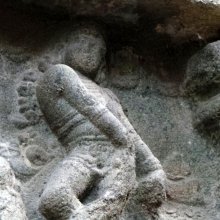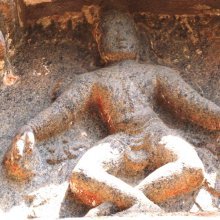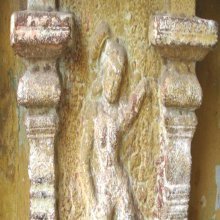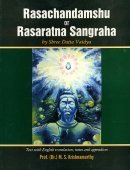Intoxication: 1 definition
Introduction:
Intoxication means something in Hinduism, Sanskrit. If you want to know the exact meaning, history, etymology or English translation of this term then check out the descriptions on this page. Add your comment or reference to a book if you want to contribute to this summary article.
Images (photo gallery)
In Hinduism
Natyashastra (theatrics and dramaturgy)
Source: Shodhganga: Elements of Art and Architecture in the Trtiyakhanda of the Visnudharmottarapurana (natya)Intoxication is associated with Dolā-hasta: one of the thirteen Combined-hand Gestures (in Indian Dramas) (known as saṃyuktahastas), according to the Viṣṇudharmottarapurāṇa, an ancient Sanskrit text which (being encyclopedic in nature) deals with a variety of cultural topics such as arts, architecture, music, grammar and astronomy.—According to the Śabdakalpadruma, dolā means a kind of swing playing stuff, generally stays in gardens and made with wood. When both of the hands are hanging downward in patāka posture it is called dolā. [...] In the Nāṭyaśāstra, the dolāhasta posture is said to indicate rush, grief, faint, fit of intoxication, emotion, illness and hit by weapon.

Natyashastra (नाट्यशास्त्र, nāṭyaśāstra) refers to both the ancient Indian tradition (shastra) of performing arts, (natya—theatrics, drama, dance, music), as well as the name of a Sanskrit work dealing with these subjects. It also teaches the rules for composing Dramatic plays (nataka), construction and performance of Theater, and Poetic works (kavya).
See also (Relevant definitions)
Full-text (+264): Mada, Madalasa, Sammada, Vimada, Pramada, Panamada, Shrimada, Madhumada, Madacyuta, Mahonmada, Kshibata, Kaipha, Unmattata, Madaka, Kshivata, Madapanaya, Ghumara, Panavibhrama, Amada, Jhingi.
Relevant text
Search found 140 books and stories containing Intoxication; (plurals include: Intoxications). You can also click to the full overview containing English textual excerpts. Below are direct links for the most relevant articles:
The Buddha (by Piyadassi Thera)
Rig Veda (translation and commentary) (by H. H. Wilson)
Charaka Samhita (English translation) (by Shree Gulabkunverba Ayurvedic Society)
Chapter 24 - The Blood derived through Systematic Regimen (Vidhi-shonita) < [Sutrasthana (Sutra Sthana) — General Principles]
Chapter 24 - The therapeutics of Alcoholism (madatyaya-cikitsa) < [Cikitsasthana (Cikitsa Sthana) — Section on Therapeutics]
Chapter 27d - The group of vegetables (Shaka) < [Sutrasthana (Sutra Sthana) — General Principles]
Chaitanya Bhagavata (by Bhumipati Dāsa)
Verse 1.2.87 < [Chapter 2 - The Lord’s Appearance]
Verse 2.19.64 < [Chapter 19 - The Lord’s Pastimes in Advaita’s House]
Verse 2.13.352 < [Chapter 13 - The Deliverance of Jagāi and Mādhāi]
Dhammapada (Illustrated) (by Ven. Weagoda Sarada Maha Thero)
Verse 195-196 - The Story of the Golden Stūpa of Kassapa Buddha < [Chapter 14 - Buddha Vagga (The Buddha)]
Verse 246-248 - The Story of Five Hundred Lay Disciples < [Chapter 18 - Mala Vagga (Impurities)]
Verse 334-337 - The Story of the Past: The Insolent Monk < [Chapter 24 - Taṇhā Vagga (Craving)]
Bhakti-rasamrta-sindhu (by Śrīla Rūpa Gosvāmī)
Verse 2.4.39 < [Part 4 - Transient Ecstatic Disturbances (vyābhicāri-bhāva)]
Verse 2.4.202 < [Part 4 - Transient Ecstatic Disturbances (vyābhicāri-bhāva)]
Verse 2.1.248 < [Part 1 - Ecstatic Excitants (vibhāva)]
Related products



